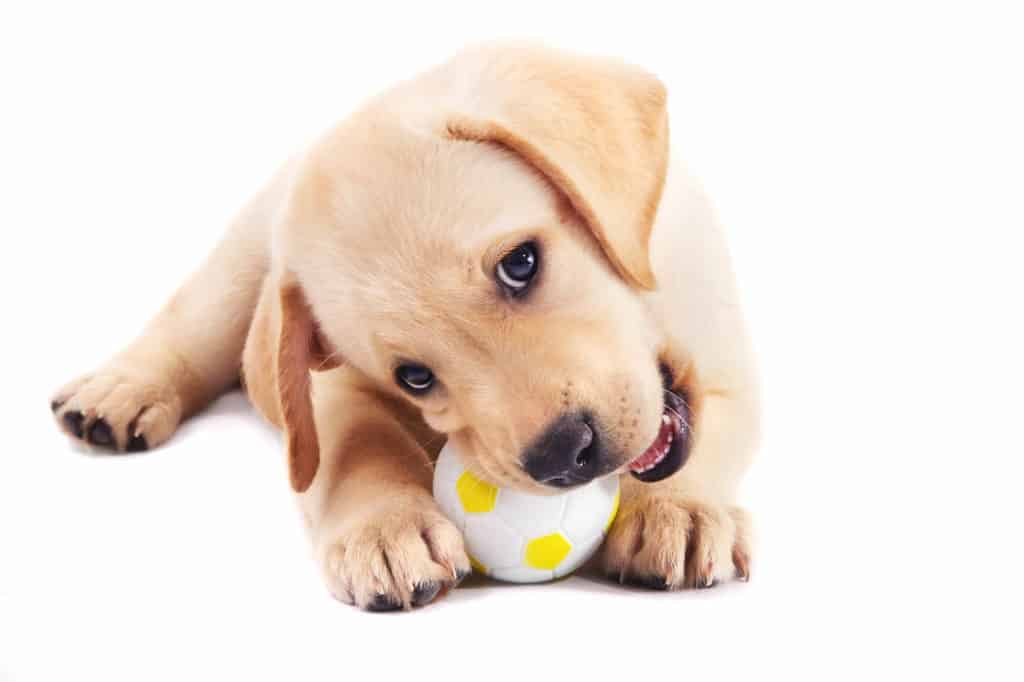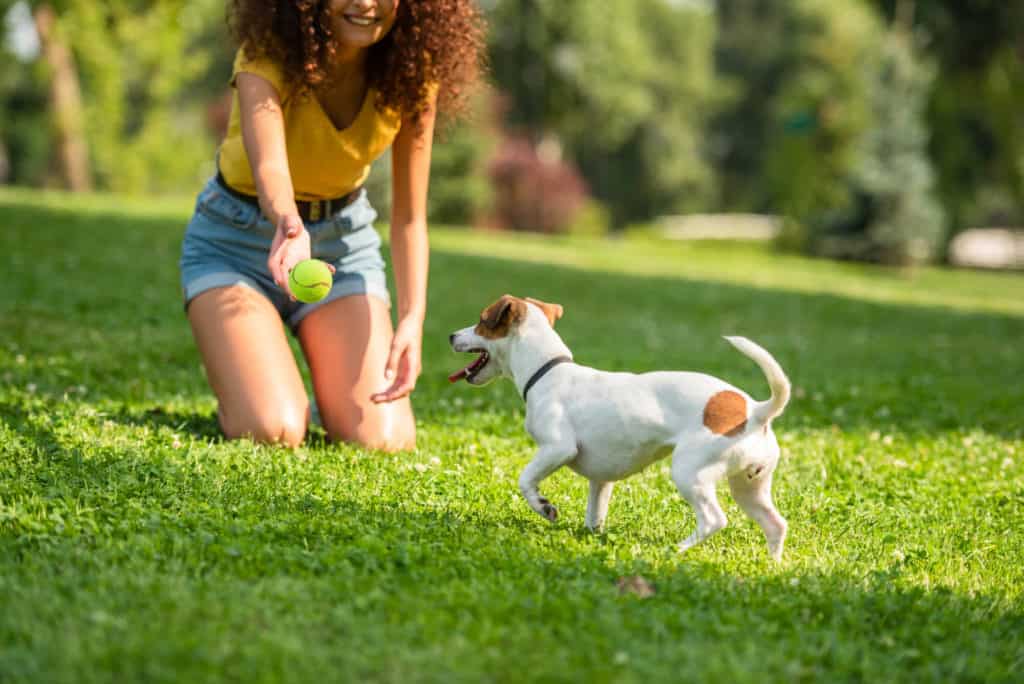If you’re wondering how many weeks is a 4 month old puppy, the answer is 16 weeks.
By 16 weeks, your puppy would have grown quite a bit and you should adapt to the changes and handle them correctly.
Being 4 months old is a transitional phase for your dog that may be uncomfortable. The physical and behavioral changes could overwhelm you if you don’t know what to do.

Physical Development of a 4 Month Old Puppy
Here is the list of physical changes you should be expecting from your puppy at four months of age:
Size
Mammals' growth rate is often the fastest in the early stage of their lives. 16 weeks is enough to considerably change the appearance of your pup. That little chubby furball you once had would mostly be a longer, taller, and leaner dog.
The growth rate depends on how large your dog breed is. Larger breeds tend to have a larger growth spurt at 16 weeks. Generally, however, dogs achieve around 40% of their final size around the 4-month mark.
Bladder Control
If your pup has been bothering you with bathroom accidents, now is the time to rejoice!
Around the 12-week mark, puppies of most breeds begin to have better control of their bladders. You can expect this control to be even better when your puppy is 14 months old.
Your puppy will begin to spend the night without accidents and sometimes even without potty breaks. The house training will begin to be easier as well. Now would be a good time to have a bathroom schedule to reduce those accidents even more.
Teething
If you find a small puppy tooth on the floor, don’t accuse the puppy’s siblings of bullying. Puppies begin teething around 12 weeks and last for around 8 weeks.
You may notice that your puppy is suffering from bleeding gums, missing some teeth, and developing a sassy biting attitude. This is normal through the teething stage because puppies, like us, don’t find teething very comfortable.
Helpful Dog Training Resource:
For help with training your dog, you should take a look at The Online Dog Trainer by Doggy Dan. Doggy Dan is an expert Dog Trainer based in New Zealand. His online resource contains Hundreds of Excellent Dog Training Videos that will take you step-by-step through the process of developing a healthy, happy well-behaved dog.
Mental Development of a 4 Month Old Puppy
These are the mental development changes you’ll notice in your puppy after four months:
Fearfulness
When your puppy is approaching the 16-week mark, he’s also approaching a critical social phase.
Before 16 weeks, your puppy is unaware of most of the dangers in the environment. Strangers, other dogs, and other animals -in general- all fall in the category of danger to your dog. However, they’re not classified as such before 16 weeks.
Once your puppy is 4 months old, he would be more aware of his surroundings. He will start to be afraid of guests, new animals, or even new objects he’s not familiar with.
Destructive Chewing
Teething is often accompanied by itchiness and discomfort that the puppy may try to alleviate using biting or chewing things.

It would be a common sight to have your puppy chewing on toys, clothes, furniture, or even your finger if you give it to him!
This behavior is normal throughout the teething period and shouldn’t be a cause for concern. Your puppy would be experiencing a comfort it can’t explain at that time and chewing seems to be the only solution in his mind.
Helpful Dog Health Resource:
Note: Our Health is #1 Priority. It should be no different for your dog. But you need to help him. The Ultimate Guide to Dog Health is the answer. This handy guide will help you recognize the symptoms of the health problems above. Get the knowledge to stay ahead of these terrible issues that can rob your lovely dog from vigor and life. Help your friend make it to 14 yrs+ without pain and suffering.
What Should You Do When Your Puppy Is 4 Months Old
We’ve mentioned some unfavorable behavioral changes earlier that you may be hoping to find a solution to. We haven’t forgotten about that, don’t worry. First, however, let’s talk about vaccinations.
Finish the Vaccinations
Your puppy should have most if not all his vaccinations done before you decide to take him to the outside world.
You may be having the good intentions of wanting to socialize and entertain your puppy but end up hurting him instead.
The immune system of the puppies at a young age still isn’t strong enough to handle diseases. Taking him for a simple walk in the park could be a quick recipe for catching an unpleasant surprise.
There are two types of vaccinations that your dog needs; core vaccinations and non-core vaccinations.
Core Vaccinations:
These are the vaccinations that all dog breeds should take to have a healthy life. All of these vaccinations should be completed before 18 weeks of age. The core vaccinations are:
- Rabies
- Distemper
- Parainfluenza
- Parvovirus
- Hepatitis
Non-core vaccinations:
These are the optional vaccinations that your vet may recommend for certain dogs according to their breed and lifestyle. These vaccinations are:
- Rattlesnake vaccine
- Lyme disease
- Bordetella
- Giardia
- Leptospirosis
- Canine Influenza (H3N8)
- Coronavirus (COVID-19)
Socialize Your Puppy to Handle the Fearfulness
Socializing your puppy before and through the critical social phase is important to prevent your puppy from growing to be a fearful dog.
It’s better to be aware of what you’re doing and learn how to socialize your puppy properly.
It’s common to have skittish or shy dogs but even if so, your dog will feed off your energy. If you remain calm and composed while your dog is interacting with new people, objects, or animals, your dog will gradually get calmer too.

If your puppy fails to use your calmness to calm himself down, you may feel that your efforts are in vain and start to get frustrated.
We strongly advise against expecting fast results from your puppy. If your puppy is still fearful despite everything you do, refrain from scolding him and simply back off the situation.
Your dog sometimes feels that you’re forcing him to interact. When you take a step back, that removes some pressure off his small back.
Remember, yelling at a scared dog will only make the situation worse.
Handle the Chewing Problem
It’s important not to punish the puppy when random chewing happens to avoid making him fear you. Instead, invest in some chew toys to help your dog with the discomfort.
Chew toys are a little more expensive than your average tog toys. However, they’re made from strong rubber that can handle the powerful bite of your destroyer. Your house will be chew-free and your pup will be happy!

Paul has been creating content for the dog niche for many years. The information he shares comes his first hand experience growing up in dog lovers household and then owning multiple dog breeds of his own as an adult. Paul enjoys doing the hard research to collect, analyze and present our dogtemperament.com readers with the best answers to their questions.